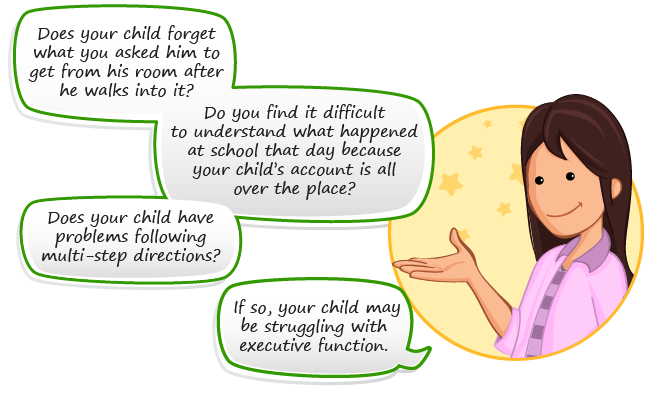Going Up the Pyramid – Executive Function

Executive function refers to a set of behavioral competencies including the ability to plan, sequence behaviors, resist interference, utilize feedback, coordinate simultaneous activities, change set and deal with novel/new situations. It allows us to mentally playing with ideas, act with considered response versus impulsive response and staying focused.
Executive function can be split into two broad categories: Organization and Regulation. Organization includes Activation, Focus and Memory, and Regulation includes Effort, Emotion and Action.
Organization
Activation refers to the organization of materials, time management, task initiation and sequencing. Task initiation is the ability to get started on an activity and come up with ideas or problem-solving strategies independently. For example, your child may not be able to initiate the task of cleaning her room because she can’t figure out the first thing to do or any of the steps after that. If your child tends to procrastinate a lot, have difficulty organizing thoughts/ideas for written work and projects or is unable to plan time for projects with a deadline, he or she may struggle with this particular executive function.
Focus refers to attending to task, maintaining attention, shifting focus concentration between two tasks/activities and ability to stay concentrated on task when background stimuli (noise, other people in the room etc.) are present. A child who has difficulty with focus may require a lot of prompting to pay attention spoken to, and is easily distracted (looking around, starts talking about unrelated topics) when doing homework. The child may take extra time to complete assignment because of background stimuli in school (classmates talking, teacher giving instructions, students walking in the hallway) or at home (family members chatting in the dining room, television/radio turned on in the living room etc.)
Memory refers to the use of working memory and the ability to recall information. Working memory is the ability to hold onto information in order to complete a task or activity. It is a combination of auditory and visual-spatial memory, and relies on attention skills too. If your child has weak working memory skills, things may "slip her mind" or be "right on the tip of her tongue."
Visual-spatial working memory is the ability to use the "mind’s eye" to hold onto visual information long enough to use it. Visual-spatial memory is like a camera in your child’s brain. It can take snapshots to help her do things like search through laundry to find a sock that matches one you’ve shown him. It helps him recall where new things are and where he is in relation to them—for example, finding the bathroom in the middle of the night at a friend’s house without bumping into walls.
Auditory working memory is the ability to hold onto information she hears long enough to use it. It’s what helps him remember the five words he just read so he can understand how they fit together in a sentence. It’s also what helps him remember a phone number someone just said to her long enough to dial it.
The ability to recall past information is important for learning and retaining learned information, as well as integrating of new information. It is about your child stores and manages information in her brain so she can pull it out of her “mental filing cabinet” when she needs to use it.
Regulation
Effort refers to regulating alertness, sustaining effort and processing speed. Your child may take longer than usual to complete tasks, have slow response time when asked questions, exhibit increased effort when presented with challenging activities and is easily fatigued.
Emotion refers to managing frustration and modulating emotions. Modulating emotions is the ability of your child to connect what she thinks and knows to how she feels and reacts. A child who has trouble regulating his emotions may be moody and have temper outbursts/tantrums. Poor emotional control might cause your child to overreact or respond inappropriately to things that upset her. He or she may act out in ways for that is not age-appropriate. For example, a 7-year-old girl throwing herself on the floor of toy store crying and screaming because she does not get the doll she wants. Or if your son loses his video game time because he didn’t finish his homework, he may have a tantrum because his siblings still have their game time.
Action refers to self- monitoring/regulating and adapting action/responses to changing situations. Self- monitoring is the ability to keep track of her performance on a task, assess how it measures up to a goal, and catch and correct mistakes. Without self-monitoring skills, your child may set the dinner table without noticing that she’s putting the silverware in the wrong place and then be surprised when the table doesn’t look like it should.
If you think that your child is struggling with executive function, occupational therapy can be helpful. A variety of activities and strategies would be used to target different executive function skills. Puzzles, logic games, memory games and functional activities would be incorporated into occupational therapy treatment. Such activities provide learning opportunities for your child in a supportive and therapeutic environment, and transference of skills to home and school environment would be emphasized.